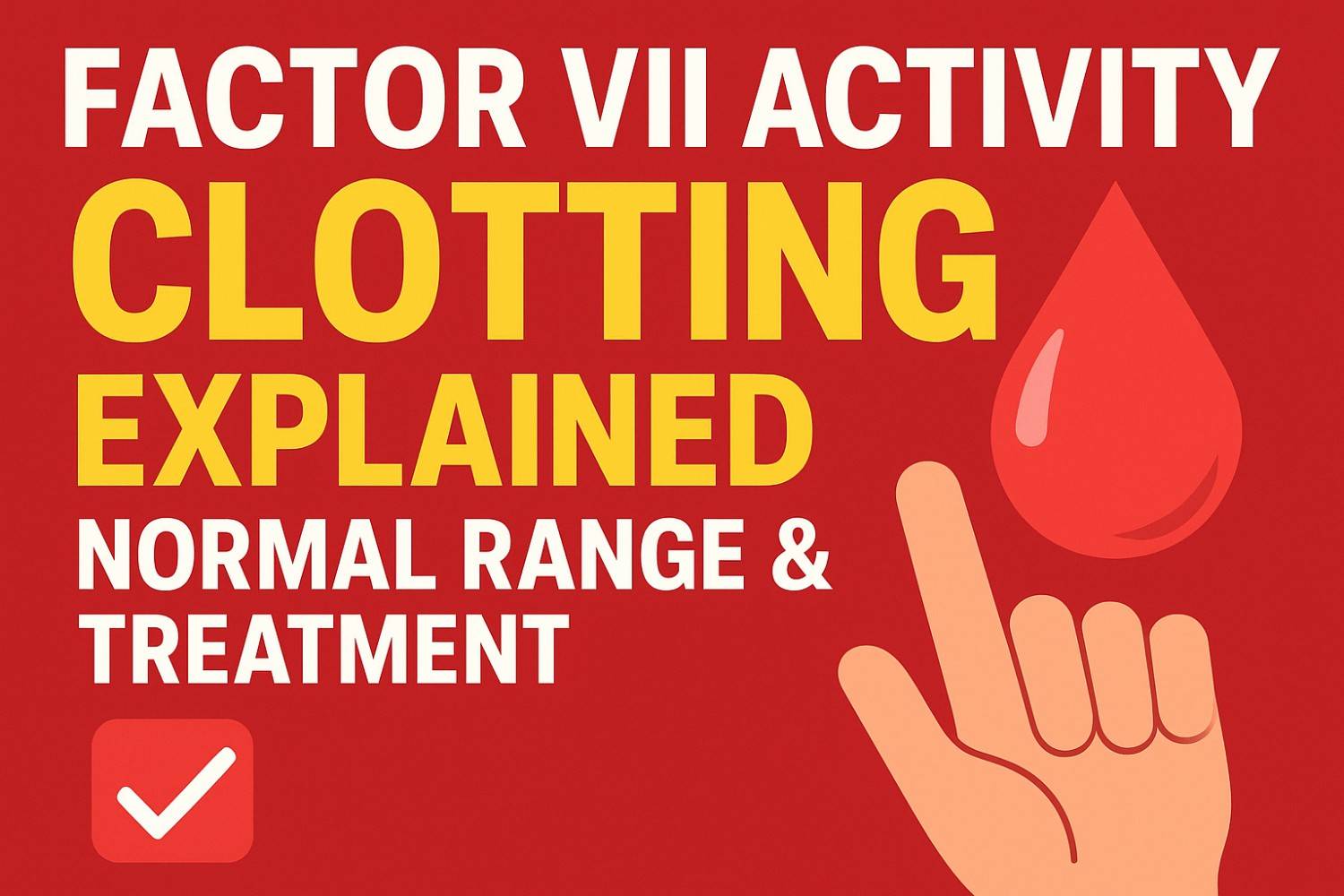
Factor VII activity clotting means the process in which Factor VII works for blood clotting. Factor VII is a protein that is made in the liver and it needs vitamin K. Its main job is to start the extrinsic pathway to stop bleeding when an injury occurs.
How Does Factor VII Work?
- When there is an injury in the body, a substance called tissue factor (TF) is released.
- This TF meets Factor VII and both together form TF-FVIIa complex. After that, the complex activates Factor X and Factor IX, which then leads to thrombin formation.
- Eventually a strong clot forms and the bleeding stops.
👉 If Factor VII does not work properly, the blood does not clot properly and excessive bleeding occurs. And if it becomes excessive, the risk of clot formation increases, which can lead to heart attack or stroke.
Factor VII Role in Clotting Cascade
Understand step by step:
- Injury occurs → Tissue factor is released
- Tissue factor + Factor VII → TF-FVIIa complex is formed
- This complex activates Factor X and IX → Common pathway begins
- Thrombin is formed → Fibrinogen is converted to fibrin
- Strong clot is formed → Bleeding stops
Important Points
- Calcium ions are necessary in this process
- Factor VII is not formed without Vitamin K
- Factor X works with V and prothrombin
What is the Normal Factor VII Activity Level?
- Usually 70% to 150% is considered normal.
- If it is less than 50% → it is a deficiency
- If it is more than 150% → the risk of clotting increases
Why Do We Have to Do a Factor VII Test?
This test checks how well Factor VII is working. Mostly it happens when PT (Prothrombin Time) is long or bleeding is not understood.
When Do We Do the Test?
- ✔ PT is high and aPTT is normal
- ✔ There is excessive bleeding
- ✔ To check before surgery
- ✔ To monitor people taking Warfarin
- ✔ To check for Vitamin K deficiency
- ✔ To diagnose Factor VII deficiency
Why Does Low Factor VII Activity (Deficiency) Occur?
- Problems since birth (rare)
- Liver not working
- Vitamin K deficiency
- Warfarin therapy
- DIC (Disseminated Intravascular Coagulation)
Symptoms:
- Bleeding does not stop even on small injuries
- Bleeding from the nose
- Bleeding in the stomach
- Periods being too heavy
- Blood filling in the joint (severe cases)
Why Does High Factor VII Activity Happen?
- Pregnancy
- Birth control pills
- Inflammation
- Obesity and metabolic syndrome
- After surgery
Risks:
- Deep vein thrombosis
- Pulmonary embolism
- Heart attack and stroke
How is the Test Done?
- We collect the blood in a citrate tube
- Plasma is separated.
- We measure it using a PT-based clotting test
- The lab reports the result as a percentage.
What Should I Do?
- Fasting is not necessary
- Tell the doctor if you are taking warfarin
Treatment Options
When Factor VII is low:
- ✔ Take Vitamin K (oral or injection)
- ✔ Fresh Frozen Plasma (FFP) if bleeding is excessive
- ✔ Recombinant Factor VIIa (rFVIIa) during surgery or severe bleeding
- ✔ Treat liver problem and check medicines
On the other hand, high Factor VII levels mean:
- ✔ Improve weight control and diet
- ✔ Stop birth control pills (if doctor says so)
- ✔ Anticoagulants only under doctor
What happens if you ignore it?
- Excessive bleeding after surgery or injury
- Spontaneous bleeding (rare but dangerous)
- Risk of heart attack or stroke
Tips to Maintain Healthy Factor VII
- Eat vitamin K rich food (spinach, broccoli, kale)
- Reduce alcohol to keep the liver safe
- Take medicines as per doctor’s advice
- If there is a family history, get regular screening done
Frequently Asked Questions (FAQs)
This checks how effectively Factor VII is working in the clot formation process.
Generally 70% to 150% is considered normal, but there can be some difference as per the lab.
This can be a sign of genetic problem, liver disease, deficiency of vitamin K, or effect of some medicines.
Yes, if Factor VII becomes high then the risk of blood clot increases and heart attack and stroke can also occur.
Not at all, it is very rare – it affects approximately 1 out of 5 lakh people.
Key Points to Remember
- ✔ Factor VII is necessary to start the extrinsic pathway.
- ✔ If levels are abnormal, bleeding or clotting problems can occur.
- ✔ Testing is done by PT-based assay.
- ✔ Treatment is based on the cause – Vitamin K, plasma, or recombinant FVII therapy.
Disclaimer
This information is for educational purposes only. Do not use it as a substitute for a doctor’s advice, diagnosis, or treatment. Consult your doctor for proper guidance.
References
- National Institutes of Health (NIH). Factor VII Deficiency. Available at: https://www.ncbi.nlm.nih.gov/
- World Health Organization (WHO). Blood Clotting and Coagulation Factors.
- Hoffman R, et al. Hematology: Basic Principles and Practice. 7th Edition. Elsevier.
- UpToDate. Overview of Hemostasis and Coagulation Disorders.